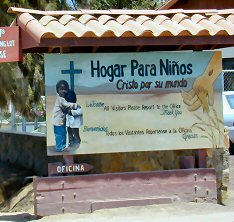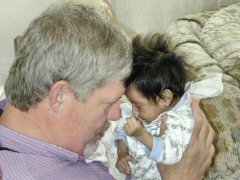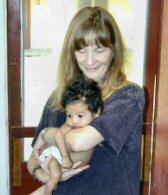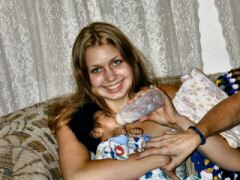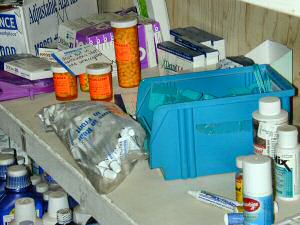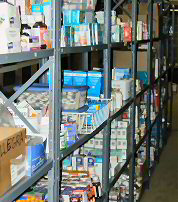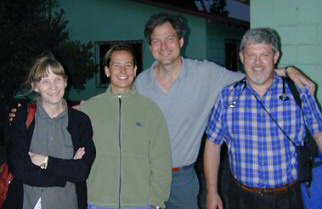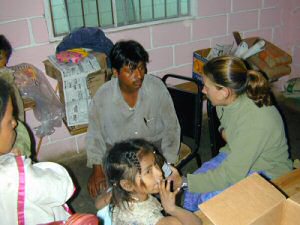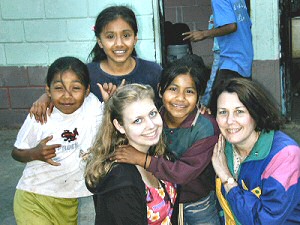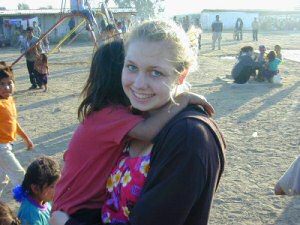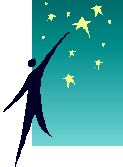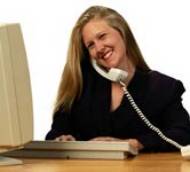
| Published by Kathy Paauw Organizing & Productivity Consultant Certified Personal & Professional Coach |
Paauwer Tools is a Monthly Ezine August 2003 Issue 42 |
||||||||||||||||
| Making a Difference | |||||||||||||||||
"It is not what we get, but who we become, what we contribute... that gives meaning to our lives." -Anthony Robbins
When our daughter was a little girl, my husband and I took a parenting class. Part of the class assignment was to read a book called Positive Discipline, by Jane Nelsen. The author of that book and the instructor of the class, Bob Bradbury, shared an important message that has always stuck with me. Kids want to count for something – to make a difference – and if they cannot make a difference in a positive way, they will make a difference in a negative way. I’ve learned that the same holds true for adults. A basic human need is to feel like we matter…like our existence on earth makes a difference. In the parenting class, we talked about some major societal changes that had evolved over the last couple of generations. Many people used to live on farms, and children were an important and contributing part of the family’s survival on the farm. Parents counted on their children to help slop the pigs, milk the cows, and collect the eggs. In other words, children counted for something. They made a difference. They felt needed because they were needed. Fast forward to the lives that we live today. Do our children feel like a needed and contributing member of the family? Are they important? Do they count for something? If you are a parent, I imagine you might be saying to yourself, “Well, of course they count for something! I love my children very much!” That’s about how you feel about your child. But how does your child feel about himself or herself? Do kids feel like they make a difference? Do they feel like they count for something? …like it matters whether or not they exist? Those of you who have subscribed to my newsletter for at least a year may remember that last summer my family’s vacation plans took us on a Mexico mission trip to build a home for a family in Vicente Guerrero, Baja. We wanted to provide an opportunity for our daughter to do something that made a difference, and we signed up to go along as adult leaders of the youth mission team. What we learned last year was that our mission experience made at least as big a difference to each of us as it did to the lives we touched in the process. (Click here to read about last year’s mission trip.) My husband and daughter and I were so struck by the needs of those we encountered last year -- and our experience had such an incredible impact on our lives -- that we decided to go back again this summer. Instead of going with a group, we made our own mission trip arrangements -- this time for a medical mission back to Vicente Guerrero. Although I have no training in the field of medicine, I am very comfortable working in a medical environment. I grew up in a medical family, I have been married to a medical professional for 22 years, and my coaching and consulting practice includes work with medical professionals. Last year when my husband was working in the Vicente Guerrero orphanage medical clinic as a volunteer physician, he had identified some organizational needs for the medical supplies and pharmaceuticals. Most of the doctors who work in the clinic are volunteers and are only there for a short time, so they don’t have time to get to know what is stocked in the supply area and where to find what they need when they need it. I had noticed last year that they had a computer in the clinic, so I had suggested the possibility of returning to implement The Paper Tiger – a software program that enables anyone to find anything in just seconds. I knew that implementing this powerful software tool would enable their revolving volunteer staff to quickly find anything in stock. About a month ago, eight of us flew to San Diego, then rented a 12-passenger van and drove to Vicente Guerrero, Baja. Our team consisted of four medical professionals, a professional organizer, and three teenage kids. The rest of this newsletter is devoted to sharing a few stories about our mission trip and how we made a difference for others…and for ourselves in the process.
|
|||||||||||||||||
"The sole meaning of life is to serve humanity." --Leo Nikolaevich Tolstoy
Our mission team consisted of myself (professional organizer), my husband Doug (Internist) our 16-year-old daughter Carly, fourth-year medical student Meredith Pierce (who also went on the mission trip with us last year), our good friends Dr. Scott Smith (Emergency Medicine physician) ) and Dr. Cathy Sandstrom (pediatrician), and their two teenage kids Devin and Tynan. A week before we arrived, a two-month-old baby was brought to the clinic, malnourished and weighing only six pounds. He was the 5th child of a 22-year-old woman. Baby Mario’s mother and father were migrant workers who had to work in the fields six days a week. Just days after he was born, Mario was being cared for at a “day care” with 40 children and two caregivers at the migrant worker camp. His parents brought him to the orphanage when he was two months old because he was not gaining weight and they were worried about his health. When we arrived at the orphanage, Mario was being cared for by a wonderful couple, Greg (the clinic nurse) and his wife, Lisa. The eight of us offered to take care of Mario over the weekend to give Greg and Lisa a break. Mario stole our hearts. He had a wonderful disposition and he craved being held and fed. We all took turns feeding him around the clock over the weekend.
On our first full day, I got started organizing the warehouse, where many donated medications and medical supplies were stored. The three teens took turns assisting me with this throughout the week. Sometimes they also assisted in the clinic by running lab tests, searching for medicine or supplies needed by one of the medical team members, or entertaining children in the waiting room while their parents were seeing the doctor.
The medicines were organized by type, and then key words were entered into the Paper Tiger software that described the medications on each shelf (example: Tylenol for Children, acetaminophen, non-Aspirin, pain relief). Each shelf was numbered, and the numbers correspond with information in the Paper Tiger. Now, if someone types in any of the words associated with a particular medication (such as "pain relief"), the Paper Tiger will bring up a listing of every drug that has those words associated with it and will give the shelf number(s) where all "pain relief" medications can be found. Or, if someone is looking for one specific drug (Tylenol for Children), one item will appear after doing a search for it by name. In the photo (above right), the little white dots on the edge of the grey shelves are the numbered labels. The medical team saw about 25 patients on the first day. Meredith and Doug worked together, as she speaks very good Spanish and Doug doesn’t. The first day they saw an amazing site.
The second day we were there, a patient was waiting when the clinic opened. He was one of the teenagers from a church group volunteering at the mission. He hadn’t slept all night and he was in the midst of a psychotic break. He had been suicidal, so our medical team was very worried about him. Fortunately the orphanage clinic was well stocked with the psychiatric medications they needed, and the adult leaders from this young man’s church group stayed with him at all times until his parents arrived to take him home. That night we went on an outreach experience to a migrant worker camp. This camp was home for hundreds of people – babies to elderly adults. Those of us who were not part of the medical team were there to play with the kids, and the medical team offered health screening and treatment for what they could treat in their makeshift “clinic” office, which consisted of tables and chairs in a building that had no electricity. They saw several people with pneumonia, poor nutrition, lots of aches and pains, and skin fungal infections. We had to leave when it got dark, because there was no light in the "clinic."
The following day, among the many patients seen by Doug and Meredith was a 17-year-old young man who had been blind from birth due to congenital cataracts. In the U.S.he would have had cataract surgery early in life and would have had good vision. His surgery did not occur until he was 11 due to lack of family funds. Because the part of the brain responsible for vision has matured by age 7-8, removing the cataracts at such a late age makes no difference in one’s ability to see. The family reported that this young man spent every day by himself in a room while his parents worked in the fields. He had recently stopped eating and wanted to die. He had been waiting for six years, because the doctors who had done his eye surgery told him he would be able to see after the surgery -- so here he was six years later still waiting to recover his sight. Our medical team had to explain to the young man and his family that he would never see. They got him hooked up with a mission outreach team, who will visit him at home and help him learn how to function as a blind person. Sunday was our only day off the whole time we were there. We had taken care of baby Mario over the weekend and he had gone back to be cared for by Greg and Lisa. We were just returning from an early dinner when an ambulance pulled up in front of the place we were staying. Greg came running out of the ambulance to report that the director of the mission (whom we’d met our first day there), was in the ambulance and was having chest pain. Doug and Scott went inside the ambulance to evaluate his condition (with no EKG or other diagnostic tools available). After a quick three-minute assessment, Scott and Doug agreed that he was having a heart attack and needed emergent intervention with high-tech cardiovascular medicine that was not available locally. We threw them their passports and they were off to San Diego – a good five hour trip north. Before they left, I asked why it was necessary for both of them to go. Doug replied, "If we have to do CPR on the way back, it would be exhausting for one person to do it without relief, and the defibrilator doesn't work." That's when I realized how serious the mission director's condition was. The ambulance blew a tire out on the way up to San Diego -- fortunately in a rare area where there was a shoulder to pull onto. This was a drive that we all feared under the best of conditions, so going 80 mph on a two-lane winding road was a harrowing experience. They lightened the trip with humor. Doug took his patient's pulse about every 10 minutes, although he figured if he was still groaning at their jokes he was still alive. They heard all about his remarkable life and how a few years ago he had been called at the age of 55 to become a missionary and leave his Hollywood job as a movie producer. All turned out well. They made it to the hospital in San Diego, where he was able to undergo the procedure needed and get appropriate medications. With half of our medical team in San Diego, the rest of us spent Monday morning finishing our work in the clinic – Cathy and Meredith seeing patients, and me and the kids completing our organization of the medical supplies and training the staff on how to quickly find things with the Paper Tiger. We drove back to San Diego in our rental van and met up with Doug and Scott that evening. Just as last year, we were all grateful to return home safely, and grateful to live with the many privileges, benefits, and choices that we have. What was so special about our experience again this year? Each of us made a difference to someone else. Our lives counted for something important. We definitely plan to go back again in the next year or two. Meanwhile, we know that we can also make a difference without traveling far. Each of us can make a difference every day – right in our own back yards. |
|||||||||||||||||
Hear
Kathy interviewed live on KKNW Radio -- 1150 on your AM dial in the
Seattle area.
I help individuals committed to moving their lives forward in powerful ways by decluttering their schedules, spaces, and minds. Past Newsletter Articles
| |||||||||||||||||
Tell a friend! Know someone who would benefit from our free tips and free ezine. If you'd like to tell friends, relatives, or colleagues about this site click here. |
Copyright © 2003 Kathy Paauw, All Rights Reserved.

